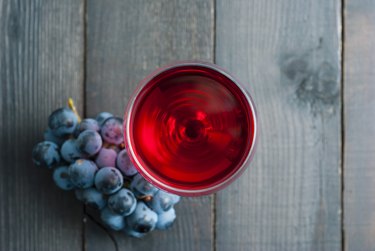
Resveratrol is a chemical compound that's found to be naturally occurring in many plant-based foods like peanuts, cocoa, blueberries and cranberries. Resveratrol can also be found in the skin of grapes, as well as in its derivatives like grape juice and wine.
What is Resveratrol?
Video of the Day
Resveratrol belongs to a class of chemical compounds known as polyphenols, which, according to a September 2017 study in the Nutrition Bulletin, are known for their antioxidant properties. It's important to note that while there are a variety of naturally occurring types of polyphenols like phenolic acid, flavonoids and tannins, these compounds are only derived from plant-based sources. So, you can expect to find them in citrus fruits, apples, onions, tea leaves, and more.
Video of the Day
Read More: 14 Wine Questions You Might Be Afraid to Ask
The University of Oregon explains that the main form of resveratrol occurring in wine is trans-resveratrol-3-O-β-glucoside, a type of polyphenol, along with large amounts of flavonoids called aglycones, both thought to form during the wine's slow fermentation process. Resveratrol in grapes is predominantly found in the skin, and according to MedlinePlus, it naturally occurs more in red grape skins and purple grape juice, and as a result, red wines are the wines high in resveratrol when compared to white wine varieties.
Wines High In Resveratrol
Since resveratrol is only present in grape skins, white and rosé varieties of wine contain fewer amounts of it when compared to red wine, which leaves the skin on during the process of fermentation. According to a July 2016 study published in Advances in Nutrition, the best wines for resveratrol include red grape varieties, which are known to contain anywhere from three times to ten times the amount of resveratrol than white wine varietals.
Read More: 5 Potential Health Hazards of Canned Wine
The pinot noir resveratrol content averages approximately ten times that of white wines such as Riesling and Gewürztraminer. The authors of the July 2016 study in Advances in Nutrition report that red wines typically average between 1.7 to 1.9 milligrams of trans-resveratrol per liter of alcohol. Wines high in resveratrol depend on various factors including the variety of grape being used in the fermentation process, the country the grape is grown in and even its exposure to bacterial and fungal microorganisms.
Benefits of Resveratrol
One of the major benefits of resveratrol is that the compound is not just found in grapes but also naturally occurs in fruits like blueberries and cranberries, nuts like peanuts and pistachios and vegetables such as onions. It is also available to purchase in supplement form in case you don't want to consume red wines high in resveratrol to reap its benefits.
Read More: 7 Surprising Health Benefits of Red Wine
According to Mayo Clinic, it is the resveratrol content of red wine that doctors believe may help in preventing the formation of blood clots and eventually, heart disease. A September 2018 report published in Biomedicines explains that resveratrol has the potential to inhibit and prevent certain forms of cancer in all of its stages. And, that's not all.
According to a controlled March 2015 study of 60 people that was published in Digestive and Liver Disease, resveratrol given to people with nonalcoholic fatty liver disease was found to improve their ability to metabolize fat and decrease their overall levels of cholesterol.
It has also shown to offer anti-inflammatory and anti carcinogenic benefits, and as Virginia Tech reports, resveratrol can even slow down the effects of aging. However, more scientific studies with a broader range of participants need to be conducted before a definitive conclusion can be given on the benefits of resveratrol.
- Oregon State University: "Resveratrol"
- Nutrition Bulletin: "The Role of Polyphenols in Modern Nutrition"
- Medline Plus: "Resveratrol"
- Digestive and Liver Disease: "Resveratrol Improves Insulin Resistance, Glucose and Lipid Metabolism in Patients With Nonalcoholic Fatty Liver Disease"
- Mayo Clinic: "Red Wine and Resveratrol: Good for Your Heart?"
- Biomedicines: "Resveratrol: A Double-Edged Sword in Health Benefits"
- Virginia Tech: "Resveratrol, a Compound Found in Red Wine, Protects Neuromuscular Synapses, Muscle Fibers in Aging Mice"
- Advances in Nutrition: "Resveratrol: How Much Wine Do You Have to Drink to Stay Healthy?"